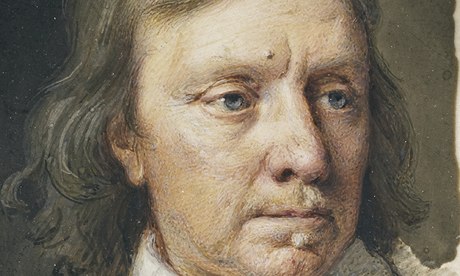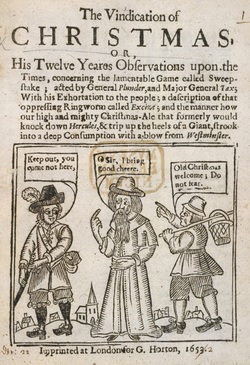
Oliver Cromwell

Introduction

In January 1649, after the execution of Charles I, England became a republic (a country without a monarch) for the only time in its history. It was called the Commonwealth, because it wanted the 'weal' (the good) of the community.
The Rump
The Long Parliament had been sitting since 1640. Some MPs had died. The army had expelled all those MPs who had supported Charles I. By 1649 only fifty MPs were left attending Parliament. They were called the `Rump' Parliament.
The REAL power in the land was the army and its leader, Oliver Cromwell. In April 1653 he went to the House of Commons with a group of soldiers and drove the MPs out.
The Barebones Parliament
Oliver Cromwell became the real ruler of England. He wanted the people to rule through Parliament, but he could not find a Parliament which would rule in the way he wanted it to! Cromwell asked all the Puritan churches to send him the names of 'godly men'. From these lists, in July 1653, he chose 140 'saints' to make up a Parliament. The first name on the list was that of Praisegod Barebones, so the Parliament became known as the Barebones' Parliament. It was a failure. The saints spent all their time arguing. On 12 December 1653 the Barebones Parliament abolished itself.
The Protectorate
On 16 December 1653 a group of army officers published a document called The Instrument of Government. It asked Cromwell to be the 'Lord Protector' of England.
Cromwell believed that he had been called by God to be Lord Protector. He still tried to rule with a Parliament. A first Parliament met in September 1654, and a second in September 1656. However, some MPs tried to reduce his power, so Cromwell dismissed both Parliaments. Yet, when the MPs asked him to become king, he refused this also.
 In August 1655, Cromwell divided the country into eleven districts. Each was controlled by a Major General and a force of soldiers. To pay for these forces, Cromwell collected an illegal tax from the Royalists. When some judges opposed him, he put them in prison.
In August 1655, Cromwell divided the country into eleven districts. Each was controlled by a Major General and a force of soldiers. To pay for these forces, Cromwell collected an illegal tax from the Royalists. When some judges opposed him, he put them in prison.
The Major Generals imposed a strict Puritan rule in England. Bear-baiting, cockfighting, the theatre, Sunday trading, horse-racing, playing cards, football and wrestling were all banned. Ale-houses were closed and drunkenness was punished. Offenders were put in the stocks or imprisoned. Maypoles were chopped down because the Puritans disapproved of dancing. In 1652 Parliament passed a law forbidding people to celebrate Christmas Day. Troops burst into people's houses and took away their Christmas dinners.
Cromwell and the Major Generals were hated. The Protectorate was really a military dictatorship, kept in power by an army of fifty thousand soldiers, but it kept the peace in a country that had been at war for nearly ten years. During these years, Jews were allowed to live in England (for the first time since 1290), and Cromwell allowed people to worship freely in private. He abolished out-of-date laws, and reduced the number of crimes which carried the death penalty.
Foreign policy
Cromwell's foreign policy was very successful. He built up a strong navy. He went to war with Spain, and in May 1655 the navy captured Jamaica in the West Indies. It is sometimes said that he laid the foundations of the British Empire.
Oliver Cromwell died in 1658.
After you have studied this webpage, answer the question sheet by clicking on the 'Time to Work' icon at the top of the page.
Links:
The following websites will help you research further:
Oliver Cromwell:
•
BBC Bitesize on Oliver Cromwell
• History Learning Site on Oliver Cromwell
•
Why not do a search for "Oliver Cromwell" on the History Help forum; you will turn up many interesting comments, including:
- this list of Why Cromwell was a Hero and
- this list of Why Cromwell was a Villain,
1 Interpretations of Cromwell
Here are some of things that people have said about Oliver Cromwell:
|
A: Ambition had corrupted his understanding. Edmund Ludlow, Memoirs (1657). Ludlow fought for Parliament but hated the Major Generals. |
B: A huge soul ... Cromwell lived and died close to God. He wanted the good of his people and he wanted peace. John Maidstone (1658). Maidstone was Cromwell's servant. |
|
C: A brave bad man. Earl of Clarendon, History of the Rebellion (1662). Clarendon was a Royalist who fought for Charles I. |
D: He was extraordinarily designed for those extraordinary things which – although he acted wickedly – he performed successfully and greatly. Sir Philip Warwick, Memoirs of the Reign of Charles I (1677). Warwick was a Royalist. |
|
E: By a strange twist of fate, Cromwell found himself to be a greater tyrant than Charles had ever dared to be. R.J. Unstead, Crown and Parliament (1962). Unstead wrote children's history books. |
F: He gave England a period of peace and made its name respected throughout Europe. Roy Burrell, Tudors and Stuarts (1988). Roy Burrell is an historian and children's writer. |
|
G: Oliver Cromwell's own comment on what he
had done was this: I called not myself to this place... I was by birth a gentleman, of no great importance. I have been called to several employments in the nation ... and I did try to do the duty of an honest man in those services, for the benefit of God and his people, and of the Commonwealth. Oliver Cromwell, Speech to the First Parliament of the Protectorate (12 September 1654). |
|